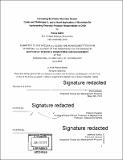Harvesting the plastic we have sowed : costs and challenges in, and a novel application of blockchain for implementing extended producer responsibility in Chile
Author(s)
Sekhri, Prerna
DownloadFull printable version (8.332Mb)
Alternative title
Costs and challenges in, and a novel application of blockchain for implementing extended producer responsibility in Chile
Other Contributors
Massachusetts Institute of Technology. Integrated Design and Management Program.
Advisor
Roberto Rigobon.
Terms of use
Metadata
Show full item recordAbstract
Cities and peri-urban areas are disproportionately large producers of solid waste in an increasingly landfilled world with plastic-choked oceans. Managing waste sustainably remains a challenge, and an expensive one, often comprising 20%-50% of municipal budgets. In the last 25 years, Extended Producer Responsibility (EPR) has emerged as an environmental policy approach in which a producer's responsibility for a product is extended to throughout its lifecycle, beyond the point of sale to the post-consumer stage. This thesis analyzes the effects of soon-to-be implemented EPR in Chile. Using packaged beverage PET bottles as a case study, it models the per-bottle cost of implementing EPR. The thesis explores the effect of EPR on the recycled PET market and its main substitute and competition virgin PET. It also considers how might EPR's implementation incorporate Chile's informal waste picking labor force. It proposes an integrated waste management system that connects "smart" (loT) delivery points, base-recycler-facing mobile-phone applications, and producers', retailers, and recyclers' inventory systems on an integrated public permission blockchain that tracks the flow of products, and measures and rewards every agent's contribution to proper waste management in a transparent, reliable, and groundbreaking way. Such an application of a blockchain does not yet exist and could prove to be an effective and empowering technology for implementing EPR.
Description
Thesis: S.M. in Engineering and Management, Massachusetts Institute of Technology, System Design and Management Program, 2018. Cataloged from PDF version of thesis. Includes bibliographical references (pages 94-104).
Date issued
2018Department
Massachusetts Institute of Technology. Engineering and Management Program; Massachusetts Institute of Technology. Integrated Design and Management Program.Publisher
Massachusetts Institute of Technology
Keywords
Engineering and Management Program., Integrated Design and Management Program.